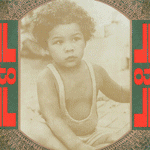|
|
 |
Dusted Reviews
Artist: Gilberto Gil Album: Gilberto Gil (Frevo Rasgado) / Gilberto Gil (Cérebro Eletrônico) / Expresso 2222 Label: Water Review date: Oct. 9, 2008 |

|
|
|
 |
Let’s get the hagiography out of the way: Gilberto Gil – one of the key participants in Brazil’s Tropicalia (or Tropicalismo) counterculture, exiled by the military regime in the late 1960s to London, returned in the early 1970s – is now, three decades later, comfortably ensconced as Brazil’s Minister of Culture. That’s a career path you don’t come across too often (and it makes a mockery of Bono’s politics by proxy), but Gil is – not to seem too quaint or gauche – not a musician you come across too often, either. That a significant number of his post mid-‘70s recordings have rated somewhere between disappointing and embarrassing matters little: these three albums, which cover the period 1968 to 1971, and their immediate predecessor (his debut, Louvacao) and successor (Refazenda) are all joyous things, examples of pop at its most articulate, artistic, and fun – sometimes, almost overwhelmingly so.
On 1968’s Frevo Rasgado, Gil was backed by Dadaist pop trio Os Mutantes, and his songs arranged by Brazil’s George-Martin-on-hallucinogens, Rogèrio Duprat. It’s too pat to say that Gil’s efforts here, along with those of Gal Costa, Os Mutantes and Caetano Veloso, shook Brazilian pop (samba, bossa nova) out of its complacency: While Michael Saltzmann is correct, in his liner notes, to paint ‘Brazil’s leading musicians’ of the time as purist ideologues – particularly in response to ‘American cultural imperialism’ – samba, bossa, etc., always sounded somehow mutable, ready to be molded into new shapes, their supple kinetics ripe for manipulation.
So, when Gil leaps from samba rhythms, through furiously funky, stinging guitar solos on “Procissão,” into strings borrowed from the Beatles’ songbook (“Luzia Luluza”), the bricolage is successful because all the modes melt into one. It’s fantastically plural, an object lesson in pop-as-experiment, and there’s also an underlying polemic here about cultural cross-pollination, what Gil and poet Torquato Neto called the geléia geral, the ‘general jelly,’ of pop. (Though Christopher Dunn notes, in his essay “Tropicalism and Brazilian Popular Music under Military Rule,” that Neto was ironically adopting the initially pejorative term from concrete poet Décio Pignatari, in a cross-generational moment where two distinct Modernisms clashed.)
The following year’s Cérebro Eletrônico was recorded just after the Brazilian dictatorship begrudgingly released Gil from prison and house arrest. Accordingly, it’s a nastier sounding record, which has a fair bit to do with Lanny Gordin’s astonishing guitar. On songs like “A Voz Do Vivo,” he burns sheets of noise from his instrument that recall the sicker end of psych rock – garish, grisly, and metallic - and his brief shots of wah are almost comic in their lurid obscenity. Indeed, dropped halfway through the record, Gil’s cover of Veloso’s “A Voz Do Vivo” is Cérebro Eletrônico’s turning point.
If before this song, Gil had simply been expanding on the rock group template Mutantes offered him in 1968, “A Voz Do Vivo”’s sections of free playing and a false ending are truly destabilizing. It heads up a great canon of wild Tropicalismo rock songs like Gal Costa’s “Objeto Sim, Objeto Não,” and Caetano Veloso’s “Eu Quera Essa Mulher.” Indeed, if “Objeto Semi-Identificado”’s wild tape collage is commonly read as Cérebro Eletrônico’s most significant formal departure, then “A Voz Do Vivo” is its most startling song, and the beating heart of the album.
After Cérebro Eletrônico, Gil was exiled to London for several years, where he recorded 1971’s Gilberto Gil (or Nêga), a lovely acoustic set which reconfigured Blind Faith’s “Can’t Find My Way Home” into an exile’s lament. It was reissued on Water a while ago, so their new run of Gil reissues concludes with 1972’s Expresso 2222, his first album after returning to Bahia. Many have commented on the ‘joy of returning’ in this album, and they’re not far wrong, but more interesting still is the ease in the songwriting and performances. Mind you, it’s hard not to be effortless when you have Tutti Moreno on drums (who some of you may also know from his recent run of beautiful records with his wife, Brazilian singer-songwriter and guitarist extraordinaire Joyce), though the entire group here plays simpatico, resulting in a supple funk that’s energized by its own joie de vivre, songs that are restless in their celebratory drive.
Here the emphasis is on the sublimation of Cérebro Eletrônico’s experimental urges, their absorption into the players’ DNA and redirection into some of Gil’s most fleshed-out, natural arrangements. And unlike Cérebro Eletrônico, as Gil here has nothing to prove, no great avantist statement to make, the result may well be his most pleasurable album to listen to. That’s not to denigrate his Tropicalismo period, but I’m always surprised by how, in the end, I end up preferring the albums these artists made just after that phase: Veloso’s further-out still Araça Azul, Gal Costa’s India, and Joyce’s Passarinho Urbano stand alongside Expresso 2222 as my favorite records from this milieu. It’s as though living through those wild years of political, personal and artistic turmoil granted them the privilege to address the geléia geral as citizens of the world, to let their songs breathe and sigh, beyond restriction – still personal and political, but older, and wiser, and more assured.
By Jon Dale
|







